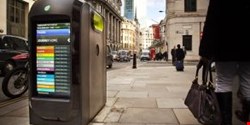
Quartz, which first reported the news, explains: "Renew, the startup behind the scheme, installed 100 recycling bins with digital screens around London before the 2012 Olympics. Advertisers can buy space on the internet-connected bins, and the city gets 5% of the airtime to display public information."
More recently, it adds, Renew London "outfitted a dozen of the bins with gadgets that track smartphones." The purpose was to recognize and allow tracking on passing phones. "That allows Renew to identify if the person walking by is the same one from yesterday, even her specific route down the street and how fast she is walking," reported Quartz. Renew could then sell targeted advertising on its recycle bins.
The first problem is that this is done without any reference to or knowledge of the phone owners. The second problem is that Renew thinks it is doing nothing wrong. "London is the most heavily surveillanced city in the world," Renew CEO Kaveh Memari told Quartz... As long as we don’t add a name and home address, it’s legal.”
Needless to say, not everyone agrees. Big Brother Watch issued a stinging rebuke. "I don’t care what they were using this data for, or intending to use it for," wrote Alex Deane – now a 'Common Councilman' in the City of London. "You’ve got no right to snatch data from the airwaves like this, no matter what your ostensible motive and no matter how innocent your alleged plans. This behavior is wrong in and of itself and it is a good thing that this case has resulted in controversy for those carrying it out and attention for the issue; all the better as it has happened early in the development of this technology – or at least, this latest iteration of it."
The BBC says that legally it is a grey area. It suggests that the collection of anonymous data through MAC addresses is legal in the UK, but compares the practice to that of using cookies on the internet where users have to be informed and given the opportunity to opt out. It would seem to be a valid analogy since "Presence Orb, the company that provides the tracking technology to Renew London, calls its service 'a cookie for the real world.'"
Renew London has now ceased and desisted; but has not ruled out restarting in the future. In its own statement Memari calls the news stories and headlines "an emphasis on style over substance that makes our technology trial slightly more interesting than it is." He confirms that "the initial trials of the Renew Orb technology have ceased", but clearly doesn't think the wifi snooping was doing anything wrong.
Meanwhile, Big Brother Watch referred the matter to the ICO. The ICO told Infosecurity in an emailed statement, “Any technology that involves the processing of personal information must comply with the Data Protection Act. We are aware of the concerns being raised over the use of these bins and will be making enquiries to establish what action, if any, is required.”
But even if the ICO concludes that Renew London's action was perfectly legal, it will need the approval of the City of London to restart in the future – and that, on current evidence, seems unlikely.